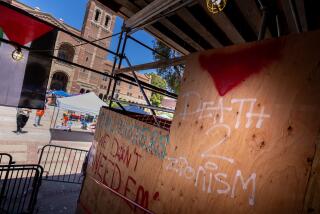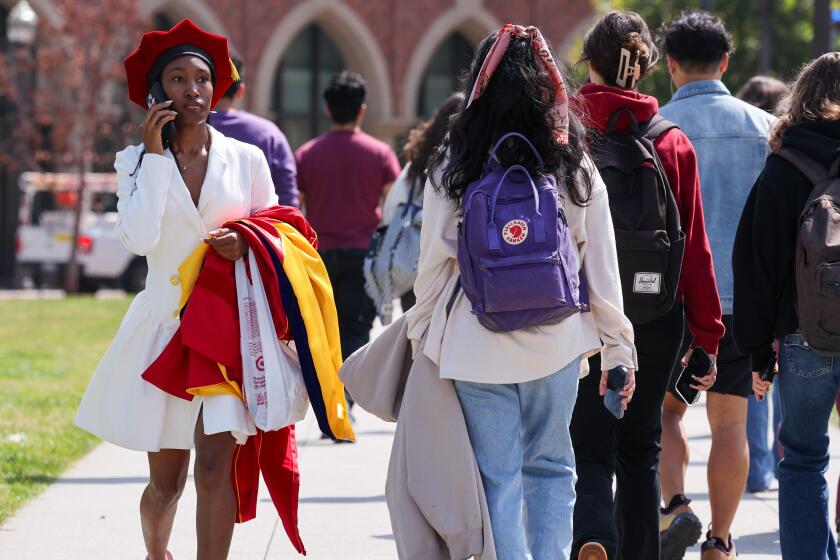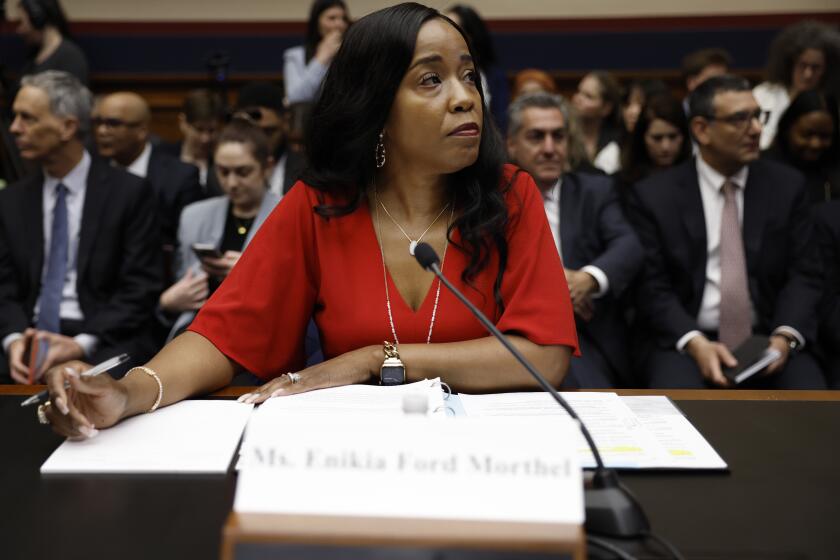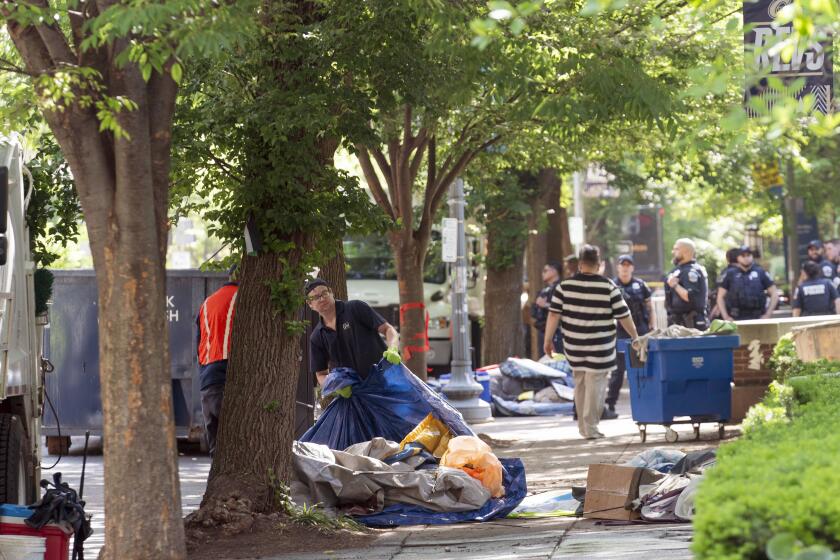College on Buddy System
Valentin Jimenez, 18 and fresh out of high school, has never lived away from home. He has rarely set foot outside East Los Angeles.
Now, with a few sweaters in his suitcase and $500 in his pocket, he has left his Mexican-born parents to attend Grinnell College in Iowa.
He’s on his own for the first time. But he isn’t alone.
Jimenez is settling in the heartland with his “posse” -- nine other Los Angeles-area high school graduates who are venturing as a group to the leafy, elite liberal arts college nearly 2,000 miles from home.
There’s Lauro Franco, who graduated from San Fernando High even though eight older brothers and sisters dropped out of school.
And Nakeyia Poitier, the future obstetrician whose South Los Angeles apartment lies within earshot of the Harbor Freeway.
And Steven Johnson, a gifted choral singer from Westchester High who hums Bach the way others rattle off hip-hop tunes.
The five Latinos, four African Americans and one Korean American in the group have spent months forging friendships to ease the transition from urban Los Angeles to rural Grinnell, where the closest mall is 50 miles away through countryside lined by corn and soybean fields.
“It’s like taking a little piece of L.A. to Iowa,” Jimenez, a Garfield High graduate whose parents don’t speak English, said of his posse friends. “We can deal with problems together.”
Jimenez and the others won admission to Grinnell, and full $25,000 annual merit scholarships, thanks to a little-known group called the Posse Foundation.
The national organization recruits mostly minority high school seniors who demonstrate leadership and other intangible qualities, but may lack the stellar grades and SAT scores usually required by top universities.
At Grinnell, the average SAT score of incoming freshmen this fall is nearly 1400 out of a possible 1600. Just one of Jimenez’s fellow posse members came close to that.
Jimenez scored 940. But he had the intangibles that posse trainers were looking for -- drive, ambition, open-mindedness. He never questioned whether he would go to college -- only where.
At Garfield High, he was a track star (he holds the school record for the 2-mile run). He played cello and was active in the Escalera Project, which provides tutoring and helps students stay on track for college. In his senior year, Jimenez snared an internship with Los Angeles Board of Education President Jose Huizar.
Similar qualities and interests can be found in other “posse scholars,” who come from Los Angeles, New York, Boston and Chicago.
Two other posses from the Los Angeles area will head this fall to Claremont McKenna College and the University of Wisconsin-Madison. In all, 223 students from the four cities are entering 22 colleges and universities, including Vanderbilt in Tennessee and Brandeis in Massachusetts.
Launched 15 years ago, the New York-based program has helped snag more than $85 million worth of college scholarships and sent nearly 1,000 high school seniors through the posse pipeline.
The posses cultivate potential young leaders who might not otherwise make it to college or tough it out once they arrive.
“I think a lot of young people have great ambitions and aspirations and then are faced with the culture shock of these isolated campuses,” said Deborah Bial, 39, an education activist who started the program in 1989 after meeting a college dropout in New York who said he would have made it if he had gone with his “posse” of buddies.
“The idea of having a group of students you can relate to helps bridge that gap between home and campus,” said Bial, adding that the posses’ predominantly minority makeup reflects the enrollment of the public schools where the foundation does most of its recruiting.
Posse graduates say their close bonds remain strong even after they leave college and join the ranks of lawyers, teachers, bankers and other professions. Eight former posse members have joined the foundation’s national staff of 45, running offices around the country or working in the New York headquarters.
The posses have served as surrogate families for youths living far from home, some for the first time.
Jimenez will be leaving a family of five brothers and sisters. His father, a carpenter with an elementary school education, would prefer that his son stay closer to Los Angeles. But Jose Luis Jimenez also wants Valentin to live a more prosperous life than the one he and his wife, a seamstress, have known.
“I don’t want any more laborers in the house,” the father said in Spanish. “I want my children to be professionals.”
For Jimenez and the other students, the journey to Grinnell has been unfolding for eight months, during weekly meetings with adult trainers to prepare socially and with tutors to improve research and writing skills.
In these afternoon meetings, high school rivalries quickly dissolved as the Grinnell-bound students talked about all of the issues they will confront in the coming year -- managing time and money, coping with homesickness.
“I’m scared. I’ve always lived in the big city. I’m going to Grinnell in the middle of basically nowhere,” Sandra Herrera, a Carson High graduate, acknowledged during one of the meetings. “The only thing that gives me comfort is my posse.”
Higher education experts said the posses’ built-in support network fills an urgent need for students who might get lost in the competitive shuffle of college life.
“They are making these kids resources for each other. That is a spectacularly well-thought-out approach,” said Patrick Callan, president of the National Center for Public Policy and Higher Education in San Jose.
So far, 90% of posse students have finished college within five years, and most finish in four, the Posse Foundation reported.
That contrasts with the 53% of all students nationwide who earn bachelor’s degrees within six years, according to the most recent federal statistics. The figures are lowest for minorities: Only 40% of Latinos finish within six years, while just 37% of African Americans make it.
Researchers said the low minority graduation rates were due partly to the isolation these students experience on campuses such as Grinnell with overwhelmingly white enrollments. Seventy-eight percent of Grinnell’s 1,400 students are white.
“It’s not enough to take a kid and dump him on a campus,” said Walter R. Allen, a UCLA professor who studies issues of diversity in higher education. “You have to be in situations where you can succeed. That requires the presence of some like-minded souls. Those who come in without any kind of support or connections are more likely to fail.”
While universities in the posse network have touted its benefits, the program hit some early snags. Two universities -- Lehigh in Pennsylvania and Rice in Texas -- dropped out in the early 1990s.
Lehigh took two posses but quit because of communication problems with the foundation, not because of anything to do with the students, a college official said.
Rice also accepted two posses for its engineering program, but one professor said the students were unprepared.
“They had to run too fast, too soon. They weren’t doing well academically,” recalled Richard Tapia, a mathematics professor in the engineering school. “From the very start, I certainly doubted that just the philosophy of a strong [team] was going to be sufficient for these students to succeed at Rice.”
Bial, the Posse Foundation founder, stressed that 16 of the 17 posse students at Rice graduated from the university, most of them in engineering, and one transferred to another college.
She said the foundation, the university and an outside minority engineering organization that helped select the students decided together to discontinue the posses there because of philosophical differences over how to run the program.
Grinnell accepted its first posse of 12 Los Angeles-area students last year. All of them did well and are returning, joining the 10 newcomers in Jimenez’s posse, university officials say. The college will have 80 posse students on campus within four years, including others from Washington, D.C., accounting for about 5% of its students.
Grinnell President Russell K. Osgood, who helped pick the first Los Angeles posse, said he was impressed by the students’ serious attitudes and supportive approach.
He’s not worried about the students’ high school grades or SAT scores, pointing out that they will meet as a group weekly with a university mentor during the first two years on campus as a part of the posse program.
“A lot of colleges work hard to admit diverse students, but don’t do enough to retain them,” Osgood said. “One of our interests is not only getting diverse and interesting students, but [having] a support structure so they will stay here and graduate.”
Emerson Molett, part of Grinnell’s first Los Angeles posse, is one of those staying.
The Westchester High School graduate said his fellow posse students helped him last year as he struggled to adapt to Grinnell, where professors are demanding and the snow falls steadily from Thanksgiving until spring. He also had to adjust to small-town life in Grinnell, a central Iowa community of 9,105 people, not counting the college.
The African American student said he and his posse mates edited each other’s research papers. And he recalled how one-on-one talks with his Grinnell mentor provided an important outlet to vent frustrations.
“Sometimes you just need to talk and know that someone genuinely cares about you,” said Molett, 19, who earned a 2.8 grade point average his first year. “I was really homesick first semester,” he said. “It really helped to know that someone from L.A. was feeling the same thing.”
Jimenez already is feeling many of the same emotions -- and classes haven’t even begun.
He is ambivalent about leaving East L.A. He’ll miss his girlfriend and his 11-year-old brother, Peter, with whom he shared a bedroom. He’ll miss his church and his little home, where pictures of Jesus share the walls with family portraits taken in Mexico.
But he’s ready for the change.
“I’ve always wanted to live around other people ... who live differently from the way I do,” said Jimenez, who plans to join Grinnell’s cross-country running team and wants to become a school counselor or psychologist.
Jimenez and the other posse members were nominated for the program by teachers and counselors. They were among 415 Los Angeles-area high school seniors who showed up downtown last October hoping to win a spot in one of the three posses.
In a first round of interviews, the students answered questions about their lives and ambitions and were asked to perform unconventional group tasks, such as using Legos to build a robot. The posse trainers were looking for team players, problem solvers, leaders.
The group was pared to 75 candidates. Then, just before Christmas, three posses of about 10 students each were chosen by the posse trainers and admissions officials from Grinnell, Claremont McKenna and Wisconsin, all of which had expressed an interest in recruiting students from Los Angeles.
Soon after, the three posses began meeting in the foundation’s downtown Los Angeles office suite where college pennants hang on the walls alongside pictures of smiling posse students already at college.
During one of their weekly meetings in June, Sandra Herrera and fellow Grinnell posse student Evelyn Gandara read aloud from a list of “common freshman mistakes” as the others listened closely: skipping classes and assignments; holing up in a dorm room like it’s a bunker; using newfound freedoms to behave like “I was just paroled from prison.”
“Has anyone heard of the freshman 15?” Herrera asked the others from the Grinnell posse, referring to the unwanted weight students sometimes gain in their first year of college.
The posse members enjoyed plenty of other activities in the last eight months. They attended a retreat in the mountains near Big Bear. They visited Grinnell. They took their families to a posse “olympics” day.
Finally, the middle of August arrived.
Jimenez packed his high school letterman’s jacket, running shoes, shirts, sweaters, sheets, towels, a couple bars of soap and a blanket.
He piled into a rented van with Franco and Gandara, whose father volunteered to drive the bunch. Then, in the middle of the night to get an early start on the road, the three teenagers -- former strangers who now call themselves friends -- headed east to the little college on the Iowa prairie.
More to Read
Start your day right
Sign up for Essential California for news, features and recommendations from the L.A. Times and beyond in your inbox six days a week.
You may occasionally receive promotional content from the Los Angeles Times.






